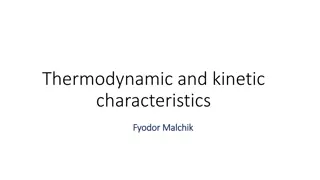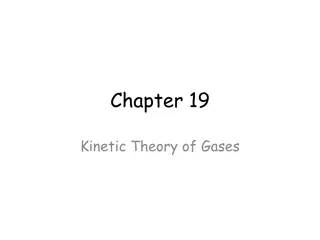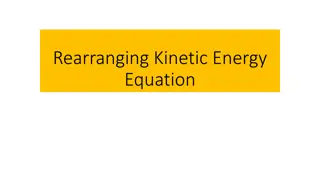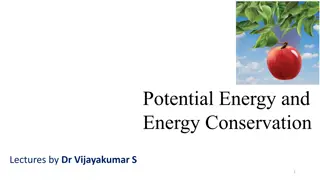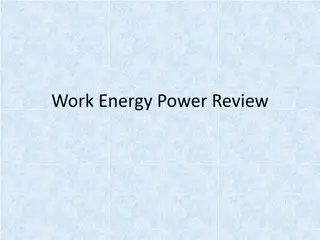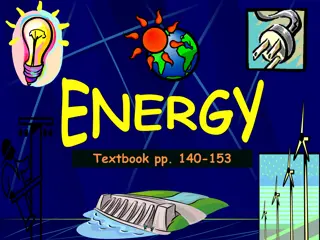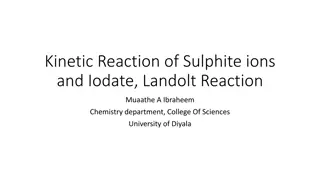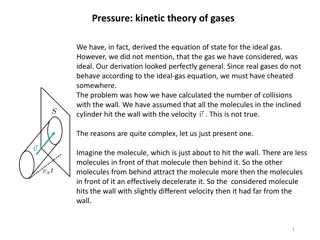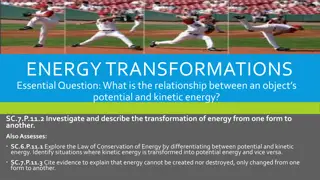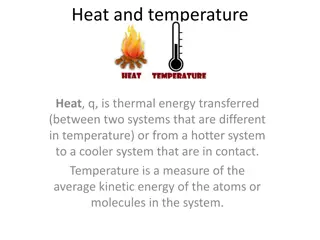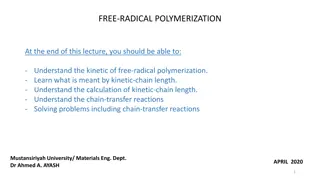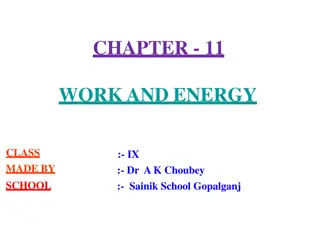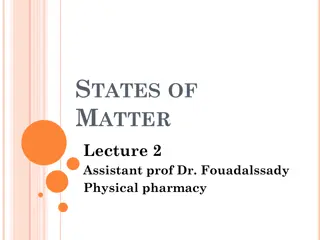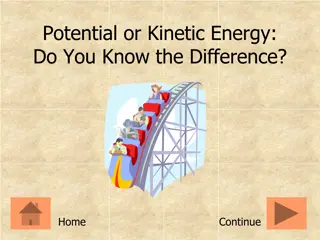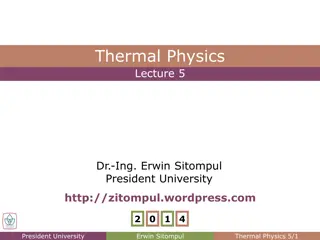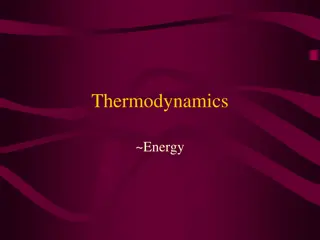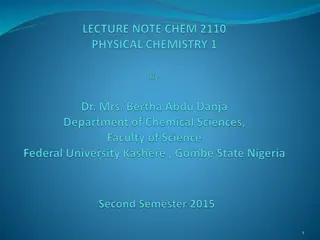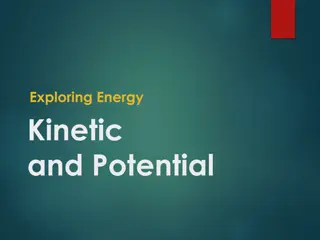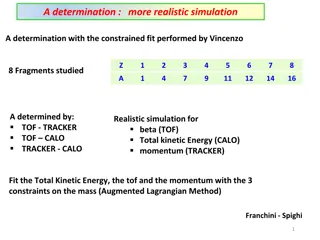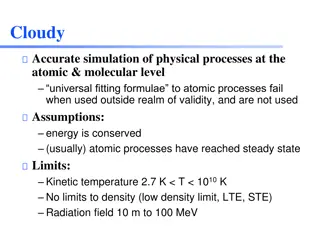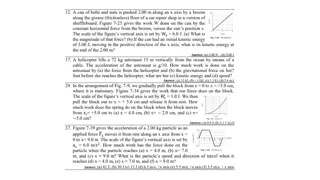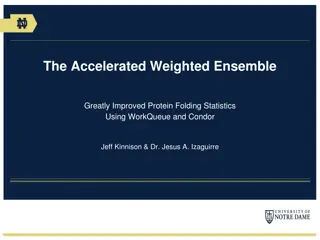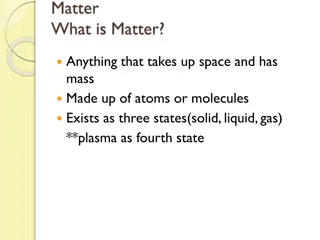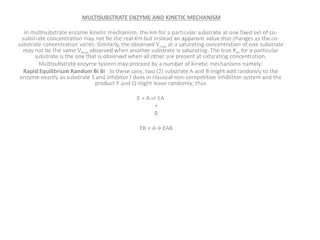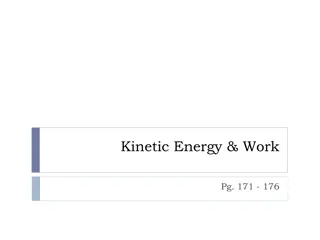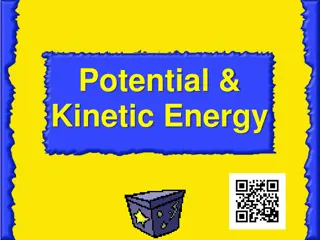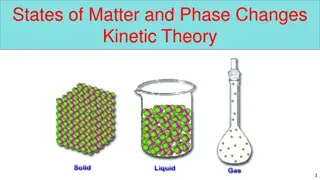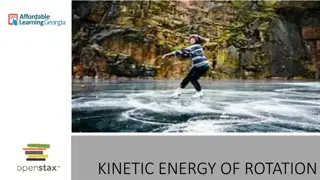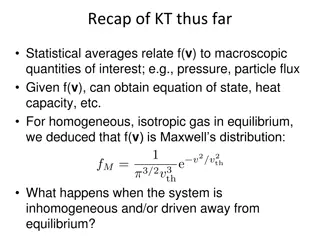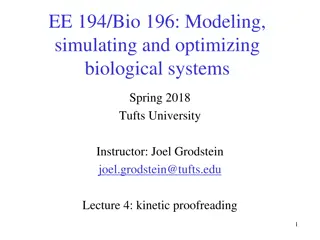Understanding Energy: Types, Potential, and Kinetic
Dive into the world of energy with a comprehensive guide covering the definition, types, and characteristics of gravitational, potential, and kinetic energy. Explore how energy is the driving force behind all work and movement, with examples and explanations provided for each energy type. Gain insig
2 views • 24 slides
Understanding Thermodynamic and Kinetic Characteristics in Adsorption Systems
Explore the thermodynamics and kinetics of adsorption through discussions on equilibrium thermodynamics, adsorption isotherms, kinetic measurements, technical applications, and interaction forces. Learn about the distinctions between physisorption and chemisorption, as well as the terminology associ
0 views • 7 slides
Understanding Kinetic Theory of Gases: Key Concepts and Equations
Exploring the kinetic theory of gases, this content covers essential concepts such as ideal gas behavior, molar mass, the equation of state, and isobaric/isothermal processes. Discover the relationship between pressure, volume, and temperature in gases, along with practical examples and calculations
0 views • 49 slides
Understanding Kinetic Energy Equations and Examples
Learn how to rearrange and calculate kinetic energy using the formula KE = 1/2mv^2. Explore the definition, formula representation, solving for mass and velocity, related equations, and practice with calculation examples. Understand how mass and velocity affect kinetic energy in various scenarios.
0 views • 11 slides
Understanding Potential and Kinetic Energy in Physics Lectures
Delve into the world of potential and kinetic energy through lectures by Dr. Sharafudeen K.N and Dr. Vijayakumar S. Explore concepts like gravitational potential energy, conservation of mechanical energy, and how energy applies to bungee jumping. Learn about the work done by gravity, the interplay o
3 views • 16 slides
Understanding Work, Energy, and Power in Physics
Work, energy, and power are fundamental concepts in physics. Work is done when a force acts on an object causing it to move, with specific conditions determining the work done. Mechanical energy examples include kinetic, elastic potential, and gravitational potential. The relationship between mass,
1 views • 19 slides
Understanding Energy and Its Various Forms
Discover the concept of energy and its different forms, including potential and kinetic energy. Learn about elastic and gravitational potential energy, as well as common types such as mechanical, thermal, and chemical energy. Engage in interactive activities to distinguish between potential and kine
1 views • 32 slides
Kinetic Reaction of Sulphite and Iodate - Landolt Reaction Overview
The kinetic reaction of sulphite ions and iodate in the Landolt reaction is a fascinating chemical process where slow and fast reactions occur sequentially, resulting in a visually striking color change. By monitoring the induction period between the two reactions, one can observe the formation of h
0 views • 9 slides
Insight into Kinetic Theory of Gases and Maxwell Velocity Distribution
The discussion delves into the kinetic theory of gases, highlighting the deviations from ideal gas behavior and the derivation of the Maxwell velocity distribution. It explores the intricacies of molecule-wall collisions, Maxwell's assumptions, the Gaussian distribution, and the concept of reversibl
0 views • 8 slides
Understanding Energy and Work: Kinetic & Potential Energy Concepts
Delve into the world of energy and work with a focus on kinetic and potential energy. Learn how these forms of energy manifest, transfer, and impact our surroundings. Explore the definitions, calculations, and examples related to energy and work in an engaging visual format.
0 views • 35 slides
Understanding Energy - Forms, Calculations, and Applications
Explore the concept of energy through various images, including forms of energy, kinetic versus potential energy, and calculations involving kinetic and potential energy. Learn about identifying energy states, calculating kinetic energy, and solving physics problems related to energy transfer. Dive
0 views • 27 slides
Understanding Energy Transformations in Science
Investigate the relationship between potential and kinetic energy, explore energy transformations, differentiate between types of energy (kinetic, potential, chemical, etc.), and grasp the Law of Conservation of Energy. Discover how energy changes from one form to another through various examples an
0 views • 11 slides
Understanding Heat and Temperature in Thermodynamics
Thermal energy transfer, heat, and temperature play crucial roles in determining the behavior of systems in terms of kinetic energy and molecular motion. The zeroth law of thermodynamics establishes the relationship between heat and temperature. Heat transfer leads to changes in the average kinetic
8 views • 8 slides
Understanding Free Radical Polymerization Kinetics
This lecture covers the kinetics of free radical polymerization, including initiation, propagation, termination, and kinetic chain length concepts. It explains the calculation of kinetic chain length and chain-transfer reactions. Key points include the rate equations for initiation, propagation, and
0 views • 11 slides
Understanding Work and Energy in Physics
Work is defined as the product of force and displacement, measured in joules. It can be positive, negative, or zero based on the force and displacement directions. Energy is the capacity to do work, with kinetic energy related to motion and potential energy associated with position. Kinetic energy d
3 views • 10 slides
Kinetic Molecular Theory and States of Matter in Physical Pharmacy
The lecture by Assistant Prof. Dr. Fouadalssady in physical pharmacy delves into the Kinetic Molecular Theory, elucidating how gases consist of particles in constant motion with negligible volume. It explains the relationship between kinetic energy, temperature, and the transition from gas to liquid
0 views • 10 slides
Understanding Potential and Kinetic Energy
Explore the difference between potential and kinetic energy, learn how they are defined, understand their conversion, and discover how they relate to speed, height, and mass in objects around us. See examples of potential and kinetic energy in action, from airplanes circling to flags blowing in the
0 views • 31 slides
Understanding Pressure and Temperature Relationship in Kinetic Theory
Exploring the connection between pressure and molecule speeds in an ideal gas confined in a box, this lecture delves into Kinetic Theory's principles, focusing on the impact of molecular collisions on pressure exerted on the box walls. The discussion covers momentum, average speed, and root-mean-squ
0 views • 16 slides
Exploring the States of Matter Through Kinetic Molecular Theory
Delve into the fascinating world of matter states with the Kinetic Molecular Theory. Learn about the properties and behaviors of solids, liquids, gases, and plasma. Understand how particle movement, energy, and spacing differ across these states, shaping their unique characteristics.
1 views • 10 slides
Understanding Thermodynamics: Energy and Heat
Explore the fundamental concepts of thermodynamics, including the conservation of energy, entropy, heat transfer, and the relationship between temperature and kinetic energy. Discover how energy transforms in natural events, the laws governing thermodynamics, and the role of heat in the motion of pa
0 views • 28 slides
Understanding Kinetic Theory of Gases and Thermodynamics
Explore the fundamental principles of the kinetic theory of gases, including the five postulates and the relationship between macroscopic properties and microscopic phenomena. Delve into the concept of entropy and thermodynamics, along with the behavior of ideal and real gases. Gain insights into th
0 views • 116 slides
Understanding Kinetic and Potential Energy: A Visual Exploration
Delve into the concepts of kinetic and potential energy through engaging visuals and explanatory content. Learn about the factors affecting kinetic energy, compare energy levels between objects in motion, explore the calculation of kinetic energy, and discover the storage and examples of potential e
0 views • 15 slides
Physics Work and Energy Quiz Questions
This quiz contains multiple-choice physics questions related to work, energy, kinetic energy, potential energy, and forces. It covers scenarios like circular motion, kinetic energy changes, braking distances, skier motion, gravitational potential energy, and more, challenging students' understanding
0 views • 8 slides
Understanding Energy: Kinetic and Potential Explained
Explore the concepts of kinetic and potential energy through illustrations and examples. Learn how kinetic energy is influenced by mass and speed, and how potential energy can be stored in different forms such as gravitational, chemical, and elastic. Understand the relationship between mass, speed,
0 views • 12 slides
University of South Alabama Flight Readiness Review Details
Detailed information on the flight readiness review of the University of South Alabama rocket project, including final launch vehicle parameters, key design features, rocket motor specifications, flight stability analysis, thrust-to-weight ratio, recovery parameters, kinetic energy calculations, and
1 views • 19 slides
Realistic Simulation for Fragment Analysis in Particle Physics
Experience a detailed exploration of fragment analysis through a realistic simulation carried out with constrained fits. Dive into the study and determination of total kinetic energy, momentum, and beta values using cutting-edge methodologies. Uncover insights into reconstructed quantities, detector
0 views • 14 slides
Cloudy: Accurate Simulation of Physical Processes at Atomic & Molecular Level
Cloudy is an open-source software that provides accurate simulations of physical processes at the atomic and molecular levels. It uses universal fitting formulae for atomic processes within valid limits of kinetic temperature and density. The software assists in analyzing gas ionization, chemistry,
0 views • 47 slides
Understanding the Photoelectric Effect: Dr. Samir Kumar Giri's Research
The photoelectric effect, first observed by Heinrich Hertz in 1887, involves the ejection of electrons from a metal plate when light shines on it. Dr. Samir Kumar Giri from Kharagpur College delves into this phenomenon, exploring how the kinetic energy of photoelectrons depends on light frequency ra
0 views • 11 slides
Physics Problems: Work, Energy, and Forces
A helicopter lifts a 72 kg astronaut vertically from the ocean, calculating the work done by the helicopter and gravitational force, as well as the astronaut's kinetic energy and speed just before reaching the helicopter. Additionally, a block sent up a frictionless ramp's normal force is determined
0 views • 22 slides
Accelerated Weighted Ensemble for Improved Protein Folding Statistics
The Accelerated Weighted Ensemble (AWE) approach addresses the challenges faced by traditional molecular dynamics (MD) simulations in generating statistically significant kinetic data for protein folding. By utilizing methods such as WorkQueue and Condor, AWE enhances efficiency and accuracy in stud
0 views • 14 slides
Understanding States of Matter and Kinetic Theory
Matter is anything that occupies space and has mass, existing in solid, liquid, gas, and plasma states. The states of matter depend on the arrangement and motion of atoms. Solids have fixed shapes, liquids take the shape of their container, and gases fill the volume of their container. The Kinetic T
0 views • 18 slides
Understanding Multisubstrate Enzyme Kinetic Mechanisms
In multisubstrate enzyme kinetic mechanisms, the apparent Km and Vmax values change with varying substrate concentrations. Different kinetic mechanisms like rapid equilibrium Bi Bi and ordered Bi Bi reactions can occur. The ping-pong Bi Bi reaction involves oscillation between enzyme forms. Various
0 views • 11 slides
Exploring Motion through Kinetic Art
Delve into the world of motion with a focus on kinetic art, inspired by the artwork of Latvian artist Valdis Celms. Discover how objects move, the forces that drive their motion, and engage in hands-on activities like creating rotating mechanisms. Through Valdis Celms' kinetic wall sculpture "Positr
0 views • 14 slides
Understanding Kinetic Energy and Work in Physics
Kinetic energy is the energy possessed by moving objects, allowing them to do work. When a force acts on an object causing it to displace, work is done, and the object's kinetic energy changes. The work-energy theorem states that work done on an object equals the change in its kinetic energy. Real-w
0 views • 9 slides
Understanding Kinetic and Potential Energy
Explore the relationship between potential and kinetic energy, as well as how energy causes change in objects. Learn about kinetic energy, speed, mass, and their impact on energy transfer through engaging examples and explanations.
0 views • 32 slides
Understanding Kinetic Theory of Matter and Phases
Explore the fundamental concepts of the Kinetic Theory of Matter, including the three pillars of kinetic energy and forces of attraction, which determine the states of matter like solid, liquid, gas. Learn about temperature, phase changes, and the phases of matter, emphasizing the role of kinetic en
0 views • 17 slides
Understanding Energy: Potential and Kinetic Forms in Grade 7 Natural Sciences
Energy in various forms is explored in Grade 7 Natural Sciences, with a focus on potential and kinetic energy. Energy is the ability to do work and exists in different types like heat, chemical, electromagnetic, nuclear, and mechanical. The sun serves as a primary energy source. Potential energy is
0 views • 11 slides
Understanding Rotational Kinetic Energy and Moment of Inertia
Rotational kinetic energy arises from the motion of mass in a rotating object, while moment of inertia quantifies an object's resistance to rotational motion. This concept is crucial for analyzing the energy and stability of rotating systems. The content explains the calculation of kinetic energy fo
0 views • 7 slides
Insights into Non-equilibrium Kinetic Theory: Inhomogeneous Systems
Statistical averages in kinetic theory connect distribution functions to macroscopic properties like pressure and particle flux. When systems are inhomogeneous or away from equilibrium, local equilibrium breaks down, leading to slow relaxation processes towards global equilibrium. The evolution of p
0 views • 12 slides
Understanding Kinetic Proofreading in Biological Systems
Kinetic proofreading is a crucial mechanism by which the body accurately discriminates between closely-related molecules, such as mRNA codons and tRNA molecules in the process of protein synthesis. This process ensures that the correct molecules bind together, preventing errors that could have sever
0 views • 55 slides

